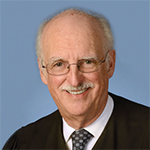Douglas Ginsburg
Senior Circuit Judge
U.S. Court of Appeals for the District of Columbia

Douglas Ginsburg
Senior Circuit Judge
U.S. Court of Appeals for the District of Columbia
Senior Circuit Judge Douglas Ginsburg was appointed to the United States Court of Appeals for the District of Columbia in 1986; he served as Chief Judge from 2001 to 2008. After receiving his B.S. from Cornell University in 1970, and his J.D. from the University of Chicago Law School in 1973, he clerked for Judge Carl McGowan on the D.C. Circuit and Justice Thurgood Marshall on the United States Supreme Court.
Thereafter, Judge Ginsburg was a professor at the Harvard Law School, the Deputy Assistant and then Assistant Attorney General for the Antitrust Division of the Department of Justice, as well as the Administrator of the Office of Information and Regulatory Affairs in the Office of Management and Budget. Concurrent with his service as a federal judge, Judge Ginsburg has taught at the University of Chicago Law School and the New York University School of Law. Judge Ginsburg is currently a Professor of Law at the George Mason University School of Law, and a visiting professor at the University College London, Faculty of Laws.
Judge Ginsburg is the Chairman of the International Advisory Board of the Global Antitrust Institute at the Law and Economics Center of George Mason University School of Law. He also serves on the Advisory Boards of: Competition Policy International; the Harvard Journal of Law and Public Policy; the Journal of Competition Law and Economics; the Journal of Law, Economics and Policy; the Supreme Court Economic Review; the University of Chicago Law Review; The New York University Journal of Law and Liberty; and, at University College London, both the Center for Law, Economics and Society and the Jevons Institute for Competition Law and Economics.

A person listed as a contributor has spoken or otherwise participated in Regulatory Transparency Project events, publications, or multimedia presentations. A person's appearance on the website does not imply an endorsement or relationship between the person and the Regulatory Transparency Project. The Regulatory Transparency Project takes no position on particular legal or public policy issues. All expressions of opinion by a contributor are those of the contributor.
Contributions
Antitrust & Big Tech
A conversation about the history of antitrust law, the consumer welfare standard, and the tech giants.
Facebook, Amazon, Apple, Netflix, and Google provide extremely valuable products and services, but their size, market share, and other concerns such as user privacy have led to concerns that they are wielding too much power.
Proponents of “populist” or “hipster” antitrust advocate for limiting the size of firms. This would require changing the Consumer Welfare Standard, which has been in place since the 1970’s.
Mark Zuckerburg’s testimony before Congress in April 2018 ignited a public debate about whether and how tech companies should be regulated. That debate continues and shows no signs of resolution.
Is it time to revisit the standards used in antitrust law? Our experts explore.
Watch this videoA Bargaining Model v. Reality in FTC v. Qualcomm: A Reply to Kattan & Muris
Douglas Ginsburg and Joshua D. Wright
In a recent article Joe Kattan and Tim Muris (K&M) criticize our article on the predictive power of bargaining models in antitrust, in which we used two recent applications to explore implications for uses of bargaining models in courts and antitrust agencies moving forward. Like other theoretical models used to predict competitive effects, complex bargaining models require courts and agencies rigorously to test their predictions against data from the real world markets and institutions to which they are being applied. Where the “real-world evidence,” as Judge Leon described such data in AT&T/Time Warner, is inconsistent with the predictions of a complex bargaining model, then the tribunal should reject the model rather than reality.
Read this article

